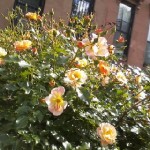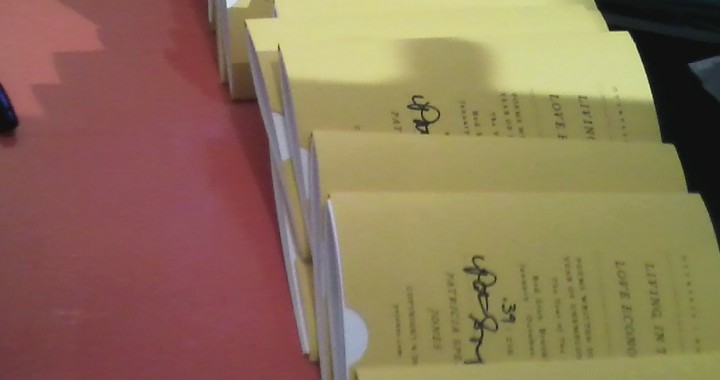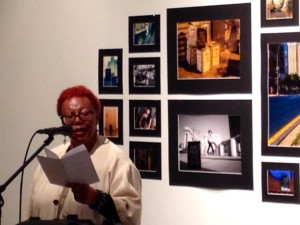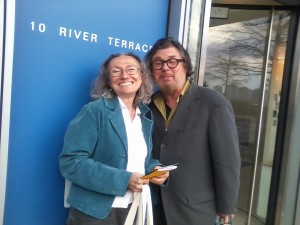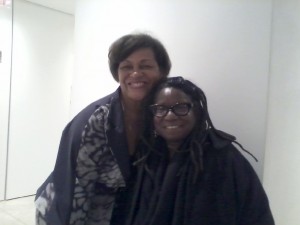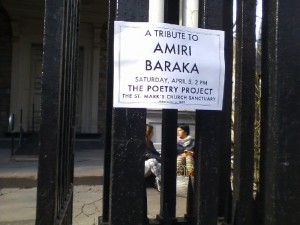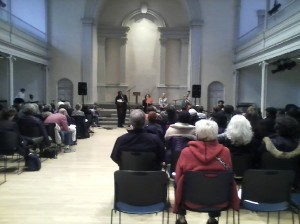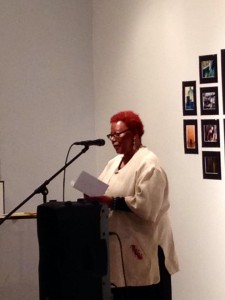This is a summer that is truly a summer. The weather in late June seemed to as beautiful as the world’s activities grew more violent, volatile. Something says to me the Creator is working overtime to provide humans relief for bad human activity–at the borders of the US and Mexico; Israel and Palestine; Nigeria and Chad–borders where children give them selves up; where children are kidnapped and murdered; where children are kidnapped, sold or murdered. Borders where evil weaves a ugly web of lies, brutality, fear. So to wake up for several days to bright sunshine and little humidity in Brooklyn–to roses blooming, birds singing, dogs being walked. To wake up fairly healthy with things to do; students to teach; people to see; food to eat and wine to drink is to have many blessings placed upon me. But all blessings are provisional. So are the bad human activity. Should we be Iraq? Should we help Nigeria find stolen girls? Should we reduce our energy use so that fracking, etc. was not so profitable? or is the phrase: “Could we”? It is July 4th. It is rainy and quiet. My brother is staying home, mowing his backyard; my sister in Arkansas is planning her church work and planning to see friends. My eldest nephew is probably working overtime in a high end hotel in Dallas. My nephews and nieces are eating barbecue and watching videos. in Texas and Tennessee. We are a small family spread around the U.S. We are also feeling the loss of my mother who this year last year was still alive. Still engaged in the world of the living, but shutting down. Later somebody in Bed-Stuy will attempt to show off the illegal fireworks bought most likely in Pennsylvania. As a Southerner, I understand crossroads. But borders. Borders are places of deep terror. Borders are where too many children are lost.
Tag Archives: Julie Patton
May is here, but April was amazing
Before April–I had the great pleasure of reading from my new book, Living in the Love Economy at Berl’s Poetry Shop with Erica Hunt and Anselm Berrigan, two great poets and very good friends. Joey Infante, et al brought my vision for this collection to a bright fruition. I am so very proud of it and the chapbook Swimming to America, from Red Glass Books both serves as a platform to my New & Selected coming out in 2015 from White Pine Press.
As I’ve often said, April is Cruel to Poets Month–there were so many readings and so little time esp if you are a poet! So I did my best. Heard Cyrus Cassells in conversation with Charif Shanahan at NYU. It was a lively and reflective dialogue after a fine reading by Cyrus. It was great to hear him talk about finding his voice after early and high praise. His new poems are taking even more lyric leaps.
Earlier in the month, went to the CUNY housed Chapbook Festival. My new chapbook, Living in the Love Economy was on display and sold! Song Cave, CUNY’s brilliant Lost & Found series-a must have for serious poetry scholars and readers–and of course Overpass Books were there. Amiel Alcalay, et al read and discussed the latest Lost & Found series including 2 booklets of Adrienne Rich’s writing about teaching at CUNY in the SEEK program.
Brenda Hillman was in town and I got to hear her read at Berl’s Poetry Shop with Evelyn Reilly–a great evening brought to us by Belladonna Collaborative.
And finally, it was really wonderful to attend A Painter and His Poets: The Art of George Schneeman at Poets House on April 26. Maureen Owen was in town from Denver; Bill Berkson, co-curator from Boston, Alice Notley in from Paris, and Ron Padgett, Anne Waldman, Larry Fagin, et al from NYC. Padgett who was the other c0-curator was an affable presenter and the readings and comments conjured a world where spontaneity and chance were as much a part of collaboration as talent and the ability to take risks. In an era where folks are waiting for funding for . . . these poets worked with a painter who was open to words as they were open to his artistic vision.
I read in very disperate events: the Ruth Malaczech Art & Impact event at the Martin E. Segal Theater Center at CUNY Grad Center where the living members of Mabou Mines and other avant garde theater people discussed the life and art of the great actress and founding member of Mabou. The Reading of the Inferno by Dante at the Cathedral of St. John the Divine on Maundy Thursday organized by Marilyn Nelson–saw some wonderful friends and it ended before midnight! And an Alice Notley tribute reading for the Downtown Literary Festival; and finally for Nita Noveno and Sara Lippman’s fine series, the Sunday Salon with Terence Degnan, et al. They posted a video. http://www.sundaysalon.com/video
And now it’s May–the sun is shining FINALLY and on May1, I saw photographs from The Birmingham Project by Dawoud Bey at The Mary Boone Gallery on Fifth Avenue. Bey has grown as an articulate and fierce documentary photographer of the Black Experience. His artistry is at its best in these works that were done in Birmingham in response to the legacy of the Black Alabamans who struggled for civil and human rights and the children who now live in the city. It is a major work and should be seen and housed in a major museum and soon.
Tribute to Amiri Baraka, April 5, St. Mark’s Church, Manhattan
photograph by Patricia Spears Jones
The Poetry Project and Cave Canem did a great job of paying homage to Amiri Baraka/Leroi Jones poetic roots and branches this afternoon. Poets and musicians performed Baraka’s works and/or paid tribute in poems to him. Quincy Troupe’s “Avalanche” had us thinking of Baraka’s welcome to that “unknown country” that he has now gone to. Julie Patton deconstructed his name melody collaborating with a bassist. David Henderson read his work/a Baraka poem and also a fine poem from Diane DiPrima. Cornelius Eady and Rough Music (Poetry’s house band) did a gorgeous multi-vocal arrangementl. I was also moved by Tracie Morris and Vijay Iyer’s deconstruction of “My Favorite Things”.
Bob Holman’s exegesis on Baraka’s most famous poem, you know the one about 9-11, the one that got the New Jersey legislature to remove the Poet Laureate position, which as Bob pointed out leads Baraka to be New Jersey Poet Laureate in perpetuity. It was a masterful critique of the poem, poet and situation. Thank you Bob Holman.
Steve Dalachinsky almost matched his wonderful performance at Jayne Cortez’ memorial last year w/ a wonderful piece in collaboration Matthew Shipp. Greg Tate brought some of Baraka’s prose from Black Music (me thinks “The Changing Same” is one of the great essays of the 20th century, just saying) reading a short riff on Wayne Shorter. And Martha and Basil King who met “Leroi” in the 1950s, Latasha Diggs, Toi Dericotte and James Brandon Lewis added to a generous and diverse group of poetic and musical voices in the tribute.
I almost left and then I realized I had to stay for Anne Waldman, who along with Henderson, Troupe, the Kings was a long time friend of Baraka and so her perspective had to be heard. She read a lovely elegy from Hettie Jones, Baraka’s first wife. Anne also discussed Baraka’s connection to Naropa. and the she and her band Ambrose Bye, Steven Taylor, and Devin Waldman served the material well. Because Anne did a fiery version of “BLACK DADA NIHILISMUS from “The Dead Lecturer”. I remembered how fascinated I am by the readings of poems across genders and Baraka was very much the enraged hetero male and Anne brought out her masculine side and worked those words. And then she ended with a kind of blessing on Baraka’s spirit and for all of us from her own summoning of female power.
I agree with Ammiel Alcalay who remarked that there are more works to unearth from Amiri Baraka and that he was extremely generous to the scholars and poets at CUNY Grad Center. Baraka, indeed all of the poets, Black and White who created the downtown literary scene deserve more scrutiny, to be read, wrestled with. They were not all Beats or Buddhists. They were as diverse as the neighborhood they lived and worked in. I am a huge O’Hara fan as many of my friends know, but I am also glad to have been part of the downtown scene in it’s third iteration in the 1970s w/ Anne and Lewis Warsh and Bernadette Mayer and Ted Greenwald and dear dear Lorenzo Thomas as my mentors, teachers, friends. It is good to see Bernadette and Ted begin to get their due and Lewis is now carving out more poets at LIU. As Steve Cannon told me, “Roi” always came back”. In many ways Baraka went back to Newark but Leroi/Amiri came to New York for friends, fun, the chance to wear his boogie shoes. And finally, Oliver Lake’s solo was extraordinary and his tribute poem a thing of great joy and admiration. Plus, he wore the most beautiful garment-truly a shirt of many colors. Where ever Baraka is he was tapping his feet.
I thank all the poets/ musicians and all the great people who made their way to the Sanctuary to pay tribute.
photograph by Patricia Spears Jones
Poems for humans’ use
I have always said that April is cruel to poets month. Poets are reading everywhere. Some are writing a new poem each day–oh you productive ones. Sometimes, we just post each others’ work on Facebook elsewhere. It is that feast more than famine moment month. But as a poet, I am pleased for the feast. It is good to hear poets as diverse as Cyrus Cassells, , Scott Hightower, Julie Patton, Thomas Sayers Ellis, Anne Waldman, Simone White and that’s just the first two weeks in New York City. At the end of March, I was pleased to launch my new chapbook Living in the Love Economy Berl’s Poetry Shop, a wonderful space for poetry books and all who read them in DUMBO, beneath the Manhattan Bridge and to attend the Center for Black Literature’s National Black Writers Conference. I look forward to readings and events in April.
photograph by John Casquerelli
This past week I led a Master Class at the 12th National Black Writers Conference at Medgar Evers College and I used “Mourning the Queen of Sunday” by Robert Hayden as the prompt. It is Hayden’s centenary and I envy Tony Medina and others who attended a conference in Detroit at Wayne State University. Whether it Academy of American Poets poem-a-day; your local library’s Poem in a pocket Day or if in NYC, you visit the luminous as in daylight Poets House in Tribeca, open your mind and heart to the efforts of we would be bards. You never know what you find there. Some time powerful, forceful, feelingforce, thinkingforce, beingforce. Poems can generate great light or deep darkness. That is good. Poems are human made for humans’ use.
